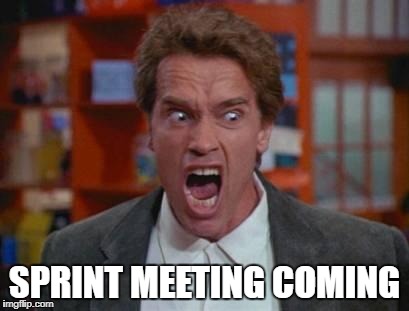| This series of posts is about stress, specifically in agile environments, where it comes from and what to do about it | ||
|---|---|---|
| Part 1 | Part 2 | Part 3 |
 “Me, and everyone I know who started doing agile, are stressed”.
“Me, and everyone I know who started doing agile, are stressed”.
If you ask around, people are feeling a bit more stressed than before the big agile arrived. Why is that, and is good, bad or ugly?
Now, where is this stress coming from in agile teams?
In the good ol’ days of waterfall, life was simple. There was a release once a year, and that last release month was really stressful. It was stressful because everyone was interested in what we were doing, what the status and quality of the release was, and if it’s actually going to happen on time (spoiler – late and full of bugs).
Very stressful release month, but mind you, this stress came with a discount. Because in the preceding eleven months, we felt no stress at all. Nobody was intereseted in what we were doing, and in fact, we contributed to the fog of war by not discussing anything with each other.
Agile is completely different.
There’s a deadline every couple of weeks. There’s the pressure we feel to show we made progress. People expect this from us, and we don’t want to let them down. Within these two weeks, there’s no hiding either. Everybody knows everything about the status, and what’s the probable outcome of the sprint. Even worse, because of the short time span, and extra visibility, we actually need to make decisions in broad day light, instead of deferring them to a later more suitable time, pushing them out of view.
Recurring deadlines, increased visibility, accountability and uncomfortable decisions – all contributing to a more stressful life.
Damn stress
Didn’t some agile manifesto principle say something about sustainable pace? Instead, this stress seems like it’s working against us.
Stress makes us feel we “need to do” something, because if not, there will be consequences. And depending on how we perceive these consequences (and perception plays a big role here) we respond in kind.
There are really two categories of stress. While they are not “good” or “bad”, they split based on our response.
Eustress, is the “good” kind. It’s the one that gets us out of bed in the morning. The one that springs us to action. It’s the motivator, the energizer. When we’re making the decisions, we’re in control and those “stressors” as they are called, move us forward.
Distress, the “bad” kind, sits heavy on us, and more so. This kind of stress stifles us, demotivates us and depletes our energy. We’re more occupied with how we feel, so we either do nothing, or make mistakes due to the perceived consequences. We also feel distressed when we’re not in control. When things are handed down to us, and we need to deal with them.
When eustress turns into distress, we’re in trouble. And agile is the srtess agent.
All the deadlines, extra visibility and transparency – we didn’t ask for them. Hence we feel the distress. even more so, it’s mostly inflicted on teams without choice. And that stress is consistent, all the time. That’s not easy to live with.
Can we do something about the stress?
Does agile cause only distress?
Is ice cream the only answer?
We’ll see how to handle stress next time.